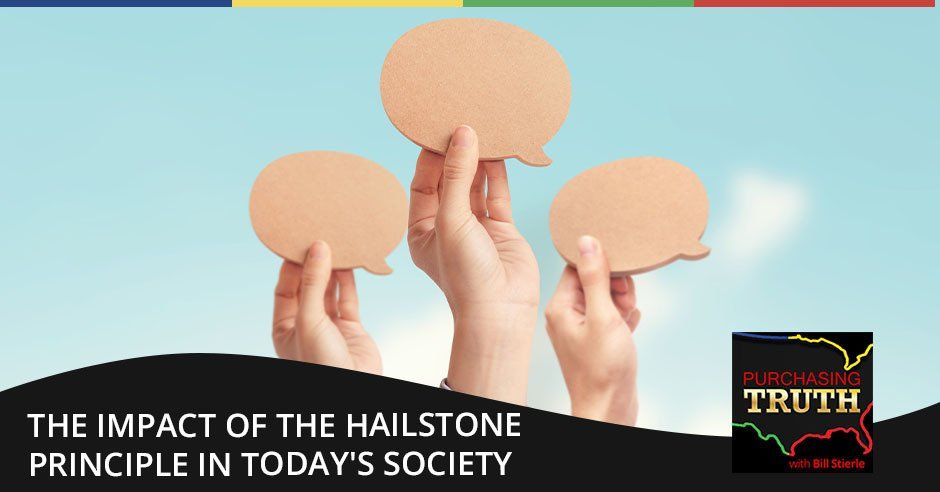The Impact of the Hailstone Principle in Today's Society
Subscribe Today!
A few words in a catchphrase can gain weight if they are repeated over and over again, gaining momentum, and causing a huge impact once they hit the intended recipient. This hailstone principle is a popular strategy in marketing, allowing businesses to convey their message to the audience without the need for lengthy materials. However, it can be used beyond brand building into influencing population behaviors in other realms. Bill Stierle and Tom go deeply into how many politicians take advantage of the hailstone principle to solidify their movements, ideologies, and platforms. This strategy is evident in the still-roaring battle over claims of fraud in last year's presidential election. Bill and Tom discuss the hailstone principle's effect on government fundraising programs, immigration policies, and the way politicians create their own "branding.”
---
Watch the episode here
We're going to talk about the hailstone principle. Can you help eliminate what that means?
I appreciate this, Tom. The hailstone principle is when you take a little thought, a little idea or a little sentence and then you start building layers around it. It's the way a hailstone is formed in a cloud. A particle of dust comes up, it connects inside a raindrop and the raindrop starts to fall to the ground. Before it hits the ground, the wind takes it back up to the top where it gets frozen and then it comes down. It only comes down enough to get wet a little bit more and pick up a little bit more H2O and then gets put back up and then there's another layer frozen on top of it. It keeps coming down and circulated inside the cloud, inside the wind structure. This rotation makes the hailstone bigger until it gets to be golf ball size and then softball-size hailstone. It can make a big difference. A message can be trapped like that in the middle. Whether the message is true or not true, that doesn't matter because when this hailstone hits, you don't want to be outside. If it's your car, a roof, it's going to get damage. Does that make some sense?
It does. If I understand correctly, you're saying that messages can go through a cycle as the dust particles do. It can get repeated over time, go through cycles and the message gets larger and larger. Eventually, it ends up landing somewhere. It started as this speck of dust.
If you have a good message and you start putting wind underneath it, it starts to get the stick and it's a message. Immediately, I'm flashed to the movie Forrest Gump where he’s walking through and this guy wants to write bumper stickers and he steps in some crap. Immediately, it's shit happens. That's the bumper sticker that makes the guy a millionaire. He's running along and the mud goes on his face. The guy hands him a yellow T-shirt and he puts it on. It looks like a happy face. I couldn't sell these things anyway because no one wants to buy yellow. Immediately, there's an image on there and he says, “There's an idea there.” The hailstone principle is similar to that. It's a thought, a concept, an idea that when you get it to stick, it can make a big difference.
Hope was Barack Obama's sticking thing. There's hope coming. To counter that, how's that hope-y, change-y thing going? It's not selling and going well when there is an obstruction piece to it because the change that you would like is not necessarily the change that everybody wants. The same thing with Make America Great Again, it's a little particle. All you got to do is blow hot air and then the hot air carries it up to the cold air. It gets a coat of water and a coat of ice on it. It comes down and then you got to keep blowing it back up again. People still want to keep that thing up there and keep trying to get gravity behind it but other people don't want to do that. Whether it's a marketing message, a political message, a branding message or a sales message, the message has got to have some stick, carry and some momentum. Otherwise, the hail falls to the ground and it melts.
It seems like, I would say, an awful lot of our government messages and messages from our politicians are this micro message that they repeat over and over. They're trying to give it oxygen to lift it up and get it to be coated again with more ice to make it have more impact.
What people don't fully get about Trump's rallies in his speeches when he did them was to drain the swamp with a testing message, Stop the Steal testing message. When you go down the path of only relying upon messages, you can't do that kind of message with certain rainstorms because then you get those big softball-size hails. That would be an example of the insurrection. It would be an example of feeding the message, “If I lose, they cheated.”
I would think the whole Stop the Steal messaging that was going on from the election that started and then kept being repeated is that particle of dust, up in the clouds growing bigger. The insurrection it seems was the hailstorm where everything fell to the ground.
With the hailstone principle, you've got to be careful about marketing and what truth you're putting in there. Click To Tweet
All of a sudden, all those people are left with a melted idea and there's no one to blow air underneath it. It's the same thing that happened in the ‘80s with Ronald Reagan. At the end of it, it was like, “They did an arms deal against what Congress voted on. They figured out how to give money to another country through an illegal form of international things. They gave arms to who? The Iran deal? You guys did that? You took the money and you moved it through here to go there?” That is hard for a person's identity to get a hold of. Your identity is with this party and your party has done something that is against not only the rule of law but also against the best interests of the nation.
We lose our world standing because of the mistake. Watch Americans because they're going to take a capitalist turn on you quickly if you're not watching. The rest of the world is getting a little bit like, “They're doing that. We have these other countries to deal with. Maybe we’ll go there. We have ideas. We can do some things ourselves.” The point of this story is with the hailstone principle, you've got to be careful about marketing messaging and what truth that you're putting in there. When that hailstone does come down, you can make it into a snow cone at least instead of going, “It's this melted thing, a rock, that hit me in the head. I'm left with all this water all over the place.” It's problematic because that's the way language works a little bit.
It's interesting to see how messages like this get repeated, trying to amplify them, trying to get them to stick and how some of the big ones happen like Stop the Steal. The counter to that was the Big Lie. Those are big ones. That’s the ultimate this side versus that side because it's the Democrats nationally versus the Republicans nationally. Honestly, I feel like the Republicans, in our situation, tend to do a better job repeating those messages and getting them to stick.
If the left keeps talking about the Big Lie, the Republicans aren't taking the bait so much. They keep repeating their message about the election that was stolen. All of these laws across the country, they're labeling them as making sure every legal vote counts as if every legal vote didn't count. These are, largely, voter suppression laws. That is what the result of this Stop the Steal repetition of messaging has been since the election. Wouldn’t you agree, Bill?
I am going to keep loyalty and keep the person close because their belief structure is not going to move.” Even though we're talking politics here, it's still the same in business and capitalism. We want to I agree. The vote, it’s like, “I want to create a message in my favor. When I create a message in my favor, keep our product loyal in the front part of the person's mind, whether it's a new type of product, a resource. It could be potatoes, new banking service and it could be how to launch a new technology.
I've got to get that branding message, whatever the branding message, into my key demographic, my key purchaser so that I am able to get it to stick. I've got to keep blowing hot air on it so that it rises to the colder temperatures and it gets a coat of ice on it. When it falls, I got to keep launching it back up. This is why marketing campaigns need to be consistent and have a flow to them. It's not, “Get it out there,” and then somebody is going to show. If you build it, he will come. If you build it, put billboards around it and market around it, people will show up.
It is all about marketing, as we've talked about many times in episodes of this show. That's why Trump was successful at getting elected the first time because he is a good brander and marketer. Like him or don't like him, he's good at that.
He's good at it because whatever the person says, he comes back to the brand message and market. People don't know about that but what they do know about is Trump properties have this list.
Marketing campaigns need to be consistent and have a flow to them. It's not just about getting it out there. Click To Tweet
They're the best.
There are no adult adults to stare it down and go, “It's interesting. The hot air that they blew in my direction is not a fit for me. It's not true.” What the Democrats don't get and the Republicans do such a better job of this is they have painted a picture around the immigrant that is counter to the message of this capitalist nation. The immigrant is bad. The immigrant is the person that comes here, willing to sacrifice their lives and time for their generation so their kids can have a better life. That's what the immigrant is.
The immigrant is the person that says, “I have the determination to be a dishwasher, a waiter, the chef and then the owner of this restaurant. I'm going to bite the dust for my lifetime doing that sequence so that my kid doesn't wash the dishes. He goes right to college and he then manages this. He has this job, skill and this ability. He’s at this income level. I shucked it out here in a restaurant but look at what my kid did. It was worth doing this in comparison to the country that I was in that doesn't have this infrastructure that we do.”
That's the thing that I don't think is talked about enough. That's a message we don't hear enough about. How bad it must be in those birth countries for these people to be willing to sacrifice themselves, their generation, for their kids. Take that risk, make that travel, come into the country however they can to achieve this. It must be pretty darn bad where they were.
It’s bad because of the need for freedom. Bad for the need for expression. Bad because of economics, the possibilities, the ability for people to work in a way that's collaborative or profitable. To better themselves to have the resources that are available and they don't. The tagging on that thing would be a derogatory label called liberal instead of the real thing, the pro-growth party. I rebranded the pro-growth party.
That should be a strong message that resonates for Corporate America and the wealthy class because every economic business and measurement of GDP and our government, succeeded or not, is based on growth. If you don't have growth, you don't have a strong economy. You always need more consumers. You need to have a continuing increase to have growth. We talked about some big messages, Stop the Steal, Big Lie. You have that the immigrant thing is on that level because it's huge in the scope of the country.
There are some other messages and there were some interesting data that we discussed that we read about how members of Congress who make the most noise use this hailstone principle in their orbit or their microclimate to stay with the weather metaphor. Jim Jordan of Ohio, Marjorie Taylor Greene of Georgia, these people have raised huge amounts of money in the election cycle for your typical member of Congress.
I read the average member of Congress raised about $3 million during a cycle for their reelection. Marjorie Taylor Greene raised about $6 million. Why is that? She's relatively new in Congress. It isn’t even for a whole two-year. She raised about $6 million off of these principal hailstone messages. This is notable even after she was stripped of committee assignments. She had less to do within Congress in terms of serving her district and she spends that time amplifying micro messages and raising money.
Immigrants are not bad people. They just want to sacrifice their lives in a different country so that their kids can have a better life. Click To Tweet
The adult adults stripped her of the position. The adult adult is like if Trump were to talk to Mark Cuban. If Donald Trump said to Mark Cuban, “You got to come and live in Trump Towers. A wealthy person like you, you won't believe what we do at Trump Towers.” Mark would look at him and go, “You're kidding me. It's like I'm not living or buying one of your things.” That's an adult adult looking at somebody that is selling and marketing to them.
People below that income level but have enough money to buy one of the Trump Towers, see it as a step up to come into that location. It's like, “Who do you want to hang around with?” If I'm in the building with a bunch of other wealthy people that are in that same mindset of, “How do I grow and change?” it is a way to lift the hailstone of the person's belief. A belief is a little piece of dirt, many times, inside the center of the hailstone that we keep propping up. It's not fully true but we keep propping it up.
It's interesting that what you're saying is somebody at Donald Trump's economic level may not buy into that marketing message. Somebody who is aspiring to be at that level is going to feed into it more. Bill, that is pretty brilliant because it explains a lot about why Trump has such a loyal base of people that are much lower on the economic or income scale than he is.
There's an aspirational quality, “I want to be to where that person is. He’s successful. He's been able to do it. He knows how to use financial instruments to borrow money. He knows to use other people's monies to do things to leverage the next project that he does, stick a couple of dollars over here for himself, accumulate and lose and let other people lose their money. I'm going to keep the money on my side. I won.” All of those debt instruments, to grow, take an opportunity to make something. Not to make and build something that has a value that can add to the capitalist system, that can add to the vision of the world.
One of my friends who used to own this building, when he sold the building, he said to me, “I wonder what they're going to do with the building now that I'm out.” He added a gym and they turned it into a guitar manufacturing place that sold online guitars. They turned it into something completely different and that was what that building looks like. They took their investment money and they made something. The whole process of good capitalism is that we were able to have the mindset and the ability to be entrepreneurial and take a risk with $1 or $2 and make something. Make something that sticks around for a while and not have that thing that you're buying that doesn't have any stickability to it.
It is interesting to take a look at talking points whether it's the vote, immigrant or the talking point of the economy. The other one that happened was the war. The war in Afghanistan is over. That's an interesting thing. What does that mean to us? Do we still have influence in that space or we don't have any influence in that space? We're another country that moved into that country and provided some stabilization for a time after the initial violence. All those groups in those different parts of the country have got to figure out how they're going to be now that America is gone. What are you going to do?
It's going to be interesting to see what happens there, talking about hanging in uncertainty out there. It became an endless war. We're saying we're not going to continue to be in this country indefinitely. That is interesting. Bill, as interesting as that is, I want to come back and close the loop on this microclimate thing a little bit. I mentioned Jim Jordan. To give you a little perspective, he raised $18 million in the cycle. That is six times the average member of Congress. He's doing it by amplifying these micro messages, repeating this hailstone effect.
One of the things that have brought this to light is former Speaker of the House, John Boehner, who has been recording and published his memoirs. He's been critical of members of Congress and the Senate within his party. A lot of times, Bill, you and I justifiably get a little criticism for having our perspective and some of our biases that maybe is a little more on the left side of the aisle. We try to illuminate things for both sides. That's our goal here.
A belief is a little piece of dirt that keeps propping in the middle of the hailstone, but it's not entirely true. Click To Tweet
It's interesting to see John Boehner, a Republican, Speaker of the House, retired admittedly. He's written his memoirs and how much he is shining a light on what he believes is a lack of governing among a lot of these members of his party. They are amplifying messages, making a lot of noise to be controversial and raise a lot of money, which helps keep them in their positions of representatives and senators. They’re in a position to govern but they're more interested, he's saying, in raising money than they are in governing and doing the work they were sent to Congress to do. Marjorie Taylor Greene having committee assignments is a simple example of that. Jim Jordan, on the other hand, is on committees and always one of the loudest voices at the microphone in any of them because he wants those sound bites to go back home.
All they're interested in is getting a sound bite as a speck of dust. The Democrats aren't good at this part of it. The best person is Bernie Sanders, free tuition, free health care. We've got to be like the rest of the developed world. He keeps blowing hot air underneath those messages. Finally, it’s like getting some gravity to it and it's getting some energy to it. Some people might be reading and they’re like, “They're going to take our private thing away.” That's not exactly what's happening. There's going to be a stabilized system that you get to have something on top of it because that's when capitalism works best. Capitalism does not work well at making things that need to be cost-effective. They're not good at that. Capitalism is how do you make things to build on top in a vibrant community and not to pour the concrete. They're not great at that.
I appreciate John Boehner coming out and talking the way he's been because his messages have been critical. Some name-calling and some labels and diagnoses that we'd like to stay away from. When there's a label, diagnosis or a name call that comes in or calling out, it needs to be attached to something specific for it to stick. If it's not specific, if the person's brain cannot identify with it, you don't have a drain the swamp moment. People see a swamp and they know that a swamp is dirty. They know that they can drain a pool, clean the pool and put fresh water in it. Drain the swamp and get rid of the alligators. Alligators and moccasins are dangerous things in a swamp. It's an ecosystem. It's hard.
John Boehner would say all these messages and raising money and not governing are some of the worst swampiest things that are going on in Washington. He also calls out Ted Cruz for the same thing. He's more interested in making a headline and using it to raise money. It often comes out when something happens. Certain members of Congress will use a statement they made, a speech they made or something's happened that's controversial in a fundraising email or letter to raise money immediately and strike while that is the news and try to raise more money.
When you think about the Bernie Sanders of the world, they have been more consistent over time. You mentioned Afghanistan. Bernie Sanders was very much against the war in Afghanistan. He's been advocating that we need to pull out for many years. He'll be the first one to say and he said it, that's one thing that Trump got right. Trump was no fan of foreign wars. He wanted to pull out of Afghanistan as well. Bernie Sanders gave him credit. He’s like, “Trump was right on that one.” Biden has made the right decision to pull out even though some of the news is against all the military advice that Biden is getting, that we shouldn't pull out. He's like, “We're ending this. We're done spending money over there.” They’re going to Bernie Sanders because he's been talking about it for decades.
The difficult part of this and this is a part of where the capitalists in the economy that's built around the military infrastructure. If there's no place to shoot bullets, how are you going to buy new bullets? Wait for that war to settle in. “I need to sell tons, crates of bullets. Where can I sell these crates of bullets because this is what I've made? Now I got to find a market for it. How can I find a market for these bullets? How can I find a market for this tank? How can I find a market for these planes, these ships? How do I find a market for artillery?” How do I find a market for a major industry that is on drawdown? That's an economic problem. It was a political problem but all of a sudden, it turns into an economic problem.
What does that mean? Joe somewhere is going to get laid off because they're not making bullets there. That thing, we don't need as many. We're not producing anything because we're not doing the war the way we used to do the war. It’s not like there are no other places to shoot bullets but they will find new places to shoot bullets. We will find new places to do it. This is the unsettling part of the hailstone effect. There needs to be a place for these different parts to move.
When we get aware of it, we go, “What's the best interest of the country?” Some politicians will say status quo. Why? Because no one got thrown out for staying the same. There’s that group. The other group is going, “I was sent to make a change. My change is breaking things.” That sounds like a hedge fund talk or it's like, “How can I wait for this thing to crash?” Puerto Rico is going through that. The hedge funds are all in there and trying to crash everything.
It's hard because the people and the economies of those countries need a breath of fresh air. They need time to restructure their debt. They need new economies to come in there. It's a hard narrative but at the same time, this communication about the hailstone and about the spec of messaging being lifted is where I'd like to leave our readers with. They can read more about it on the blog post or chase us down if they want to learn more about how to craft that on their own.
It sounds good, Bill. I almost wish that the Schoolhouse Rock people were still making cartoons. They could make one about the hailstone effect.
That's funny. That's true. That would be a strong message. This has been great, Tom. We'll talk to you next time.
Love the show? Subscribe, rate, review, and share!









